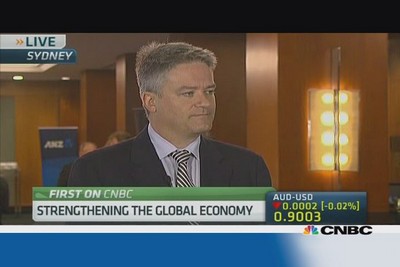An "action-oriented" plan by the G-20 to add an extra two percentage points to global growth over five years has a good chance of succeeding, International Monetary Fund chief Christine Lagarde said on Sunday.
Speaking at a meeting of the Group of 20 world economies in Sydney, Lagarde also praised Australia's presidency of the gathering.
The G-20 said in a communiqué on Sunday that they would develop policies to lift their collective gross domestic product by an additional 2 percent over the coming five years, generating over $2 trillion in additional output and creating tens of millions of new jobs.
"We believe that if the reforms that have been identified are adhered to and delivered by the various authorities then that is a goal that can be achieved and possibly exceeded," Lagarde told reporters on Sunday.

CNBC
CNBC's Oriel Morrison interviews IMF chief Christine Lagarde
The G-20– which collectively represent 85 percent of the global economy –have until November when the next G-20 summit takes place in Brisbane, Australia, to finalize their own strategies to implement the structural reforms necessary to up growth by 0.5 percent per year, Reuters reported.
"The beauty of the plan is that it's going to rely essentially on domestic measures that will be beneficial for domestic markets," Lagarde told CNBC on the sidelines of the G-20 meeting. "It's not some 'far-fetched plan out in the clouds," she added.
The IMF forecasts 3.7 percent global growth in 2014 and 4 percent in 2015.

Play Video
Speaking about the fallout of an unwinding of U.S. monetary stimulus on frail emerging markets, Lagarde said the U.S. Federal Reserve did have an open mind about the implications of its actions for the developing world.
(Read more: Australian Finance Minister: 'We could do better')
"Clearly during the discussions yesterday and today, there was an open mind on the part of the chairman of the Fed to understand the issues and listen to the concerns and what you call the angst of the emerging market economies," she told CNBC.
Lagarde added that it was important to remember that emerging market economies were subject to their own nuances and should not be bundled together.
"You can't just put all emerging market economies into one bucket… and assume that they are all the same. They are all very different. Some of them have taken policy measures in order to resist potential volatility and that has proven efficient," she said.



ไม่มีความคิดเห็น:
แสดงความคิดเห็น